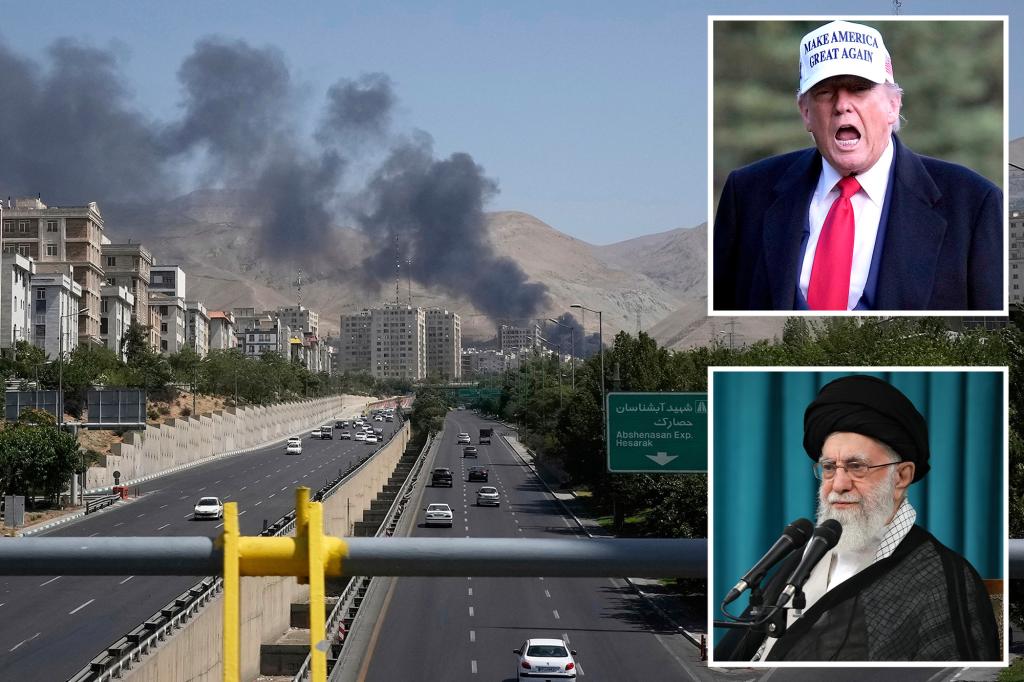WASHINGTON — President Trump said Monday that Iran is willing to “talk” about limiting its uranium enrichment after Israel launched a large-scale attack that destroyed many of Tehran’s top officials and above-ground nuclear sites.
“They’d like to talk, but they should have done that before I had 60 days, and they had 60 days, and on the 61st day, I said, we don’t have a deal,” Trump said at the top of his meeting with Canadian Prime Minister Mark Carney at the G7 in Kananaskis, Alberta.
“They have to make a deal, and it’s painful for both parties, but I’d say Iran is not winning this war, and they usually talk, and they should talk immediately, before it’s too late,” the president added.
President Trump arrives at the G7 Summit in Kananaskis, Alberta, Sunday, June 15, 2025. AP
IDF Home Front Command and medics look for casualties in a house destroyed by a direct hit in Bnei Brak following an Iranian ballistic missile barrage toward Israel. Matan Golan/SOPA Images/Shutterstock
Israel carried out the airstrikes against several Iran nuclear sites Friday after UN investigators also disclosed that Tehran’s program was nearing weapons-grade uranium enrichment.
Trump told The Post on Friday that he “always knew the date” the attacks would come and that he had given Iran 60 days to come to a deal that would get rid of their potential nuclear capabilities — but Tehran’s negotiators had refused.
He had first come up with the 60-day ultimatum after meeting with Israeli Prime Minister Benjamin Netanyahu at the White House on April 7 — and he insisted to The Post that Israel gave him advance warning of the airstrikes.
The president has stressed that there is still room for diplomacy and an eventual deal — as Israel has not yet destroyed every nuclear site in Iran, including the Fordow enrichment facility located inside a mountain.
A plume of heavy smoke and fire rises over an oil refinery in southern Tehran, after it was hit in an overnight Israeli strike, on June 15, 2025. AFP via Getty Images
The US “could get involved” in the Iran conflict, Trump told ABC on Sunday, without elaborating.
A reporter at the G7 asked the president about the red line that would prompt the US to get involved, but Trump refused to answer.
Israel launches airstrike on oil warehouse in Tehran. ABEDIN TAHERKENAREH/EPA-EFE/Shutterstock
The president said the US “has always supported Israel” in terms of intelligence in response to another question about Iran.
“We have for a long time, slowly, and Israel is doing very well right now,” Trump replied.
Iranian Supreme Leader Ali Khamenei meets with the speaker and representatives of the 12th Session of the Islamic Consultative Assembly in Tehran, Iran, on June 11, 2025. APAImages/Shutterstock
Israel has used their Iron Dome to intercept the missiles Iran has launched into their airspace in retaliation, and have been successful in shooting down the majority.
Iran is one of several critical issues that will be discussed at the G7 meeting, which includes leaders from the UK, Germany, Canada, Japan, Italy and France.
Trump also said he wants to talk trade with Carney in hopes of reaching a tariff deal soon. He will also meet one-on-one with the Chancellor of Germany Friedrich Merz and UK Prime Minister Keir Starmer on Monday.
President Donald Trump meets with Canadian Prime Minister Mark Carney at the G7 summit. REUTERS
Many leaders have drafted a document calling for the de-escalation of the Iran-Israel conflict, Reuters reported, but Trump has yet to sign it.
“Under the strong leadership of President Trump, the United States is back to leading the effort to restore peace around the world. President Trump will continue to work towards ensuring Iran cannot obtain a nuclear weapon,” a White House official said in a statement to The Post.
